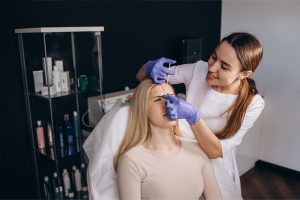Essential Steps for Menopause Hormonal Balance

Menopause is a natural phase in a woman’s life, marking the end of her reproductive years. While it is a significant milestone, the accompanying hormonal changes often lead to a range of symptoms that can impact daily life. In this blog post, we will explore effective steps for menopause management that focus on achieving hormonal balance. Let’s delve into SheMD’s five key steps that proved to be effective and easy to understand.
Menopause and Symptoms
Menopause typically occurs in a woman’s late 40s or early 50s, signaling the cessation of menstrual cycles. During this transition, hormonal fluctuations, particularly a decline in estrogen and progesterone levels, can result in various symptoms. Common menopause symptoms include hot flashes, night sweats, mood swings, sleep disturbances, and changes in libido.
Understanding and effectively managing these symptoms is crucial for women experiencing menopause. By adopting a holistic approach that targets hormonal balance, one can navigate this phase with greater ease and comfort.
Step 1: Stress Management
Stress can make menopausal symptoms more noticeable and disrupt hormonal balance. Chronic stress triggers the release of cortisol, a hormone that, when elevated over time, can interfere with the delicate balance of estrogen and progesterone. To manage stress during menopause, incorporating relaxation techniques such as meditation, deep breathing exercises, and mindfulness can be immensely beneficial. Finding activities that bring joy and relaxation, whether it’s reading, gardening, or spending time with loved ones, can significantly contribute to overall well-being.
Step 2: Eat Healthy
The diet plays a pivotal role in menopause management. Consuming a balanced and nutritious diet can positively impact hormonal balance and alleviate symptoms. One crucial aspect is lowering sugar intake. High sugar consumption can lead to insulin resistance, affecting the body’s ability to regulate hormones. Opt for a diet rich in whole foods, including fruits, vegetables, lean proteins, and whole grains. Incorporating phytoestrogen-rich foods, such as soy, flaxseeds, and legumes, can also offer natural support for hormonal balance.
Step 3: Get Enough Sleep
Quality sleep is essential for hormonal harmony, and menopausal symptoms like night sweats and insomnia can often disrupt it. Establishing a bedtime routine, creating a comfortable sleep environment, and avoiding stimulants like caffeine close to bedtime can contribute to better sleep quality. If sleep disturbances persist, consulting a healthcare professional for personalized guidance is advisable. Adequate and restful sleep not only supports hormonal balance but also enhances overall well-being during the menopausal transition.
Step 4: Regular Exercise
Engaging in regular physical activity is a cornerstone of menopause management. Exercise has been shown to reduce the severity of menopausal symptoms, boost mood, and support hormonal balance. Aim for a combination of aerobic exercises, strength training, and flexibility exercises. Activities like walking, swimming, or yoga can be enjoyable and effective. Consult with a healthcare provider before starting a new exercise regimen, and find activities that align with your preferences to make them sustainable in the long term.
Step 5: Healthy Weight and Hydration
Maintaining a healthy weight is crucial for hormonal balance and overall well-being. Excess body weight, especially around the abdomen, can contribute to hormonal imbalances and exacerbate menopausal symptoms. Adopting a balanced diet and incorporating regular exercise can aid in weight management during menopause.
Hydration is equally important, as adequate water intake supports various bodily functions, including hormone regulation. Aim to drink plenty of water throughout the day, and consider herbal teas or infused water for added flavor without added sugars or caffeine.
Bonus step: regular medical check-ups
Regular medical check-ups are crucial for menopause management, as they help women monitor hormone levels, bone density, and cardiovascular health. These assessments can help detect and address potential issues early on, ensuring a proactive approach to menopause management. Healthcare professionals may recommend screenings like mammograms, bone density scans, and cholesterol checks to assess women’s overall health during this transitional phase.
Open communication with professional healthcare providers like SheMD can facilitate discussions about mood swings, anxiety, and other mental health concerns, leading to tailored interventions that promote emotional well-being. Integrating regular medical check-ups into a menopause management plan adds a layer of proactive care that goes beyond symptom management. By staying connected with healthcare professionals, women can receive personalized guidance, address emerging health issues, and ensure a holistic and strategic approach to navigating the menopausal transition.
Conclusion
Navigating the menopausal journey involves embracing a holistic approach to hormonal balance. By incorporating stress management techniques, adopting a healthy diet, prioritizing quality sleep, engaging in regular exercise, and maintaining a healthy weight with proper hydration, women can empower themselves to manage menopausal symptoms more effectively. Remember, consulting with healthcare professionals for personalized advice is essential, ensuring a tailored approach to menopause harmony that suits individual needs and preferences. Board-certified gynecologist at SheMD is always there for you!



